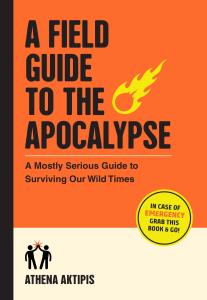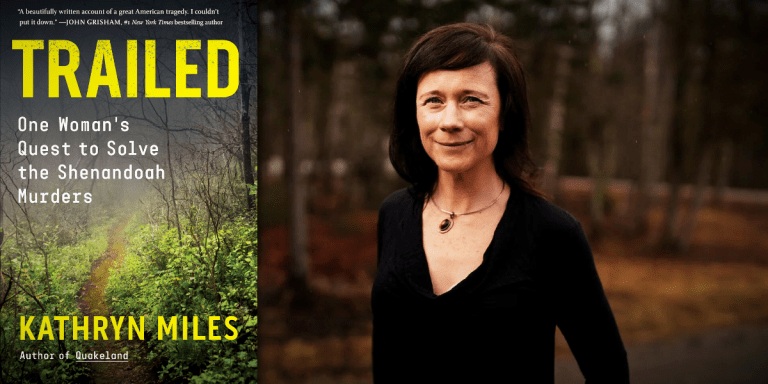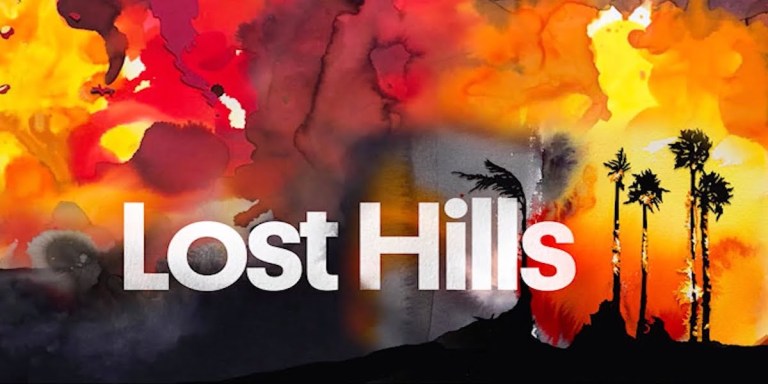How to Thrive in the Apocalypse
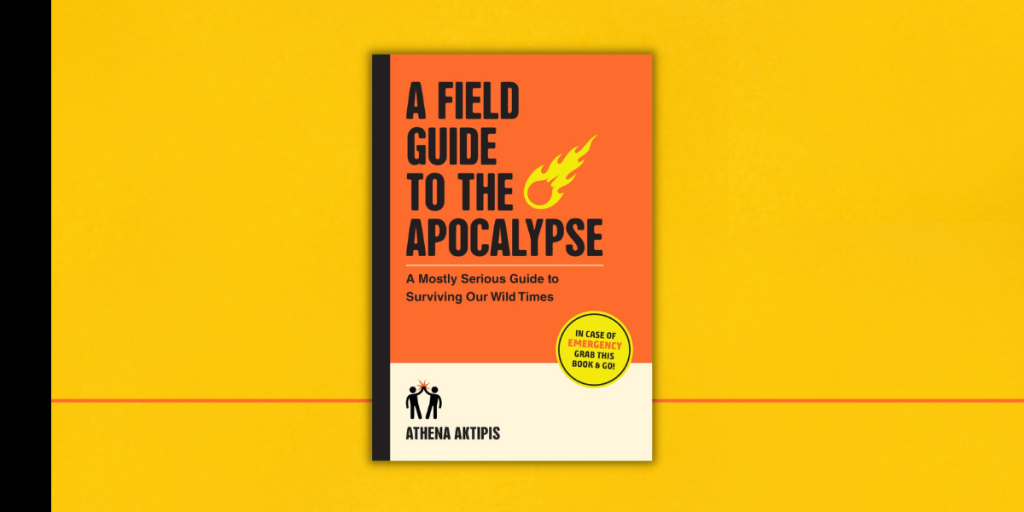
Now that we know we’ve got what it takes to survive The Big One, it’s time to talk about how to make the apocalypse fun (yes, fun!) and also part of our everyday lives. This includes being ready for emergencies (i.e., having your preps in order as part of a relevant and fulfilling part of daily, weekly, monthly, and yearly routines), but it also means embracing our current apocalyptic moment and thriving in it. Thankfully, these goals are surprisingly compatible.
We have the cognitive and cultural tools to help us deal with apocalypses as individuals, as groups, even as an entire civilization. Many of these tools are also how we can make the apocalypse less of a drag. Having fun is an extremely important tool in our apocalypse handbook. In fact, having fun preparing for the apocalypse may have been selected by evolution to help us stay engaged and working together when things get really bad. People and groups who were able to keep risk management as a fun part of their mindset, lifestyle, and culture no doubt had an advantage over those who held fast to denial when they were facing a challenging and uncertain future.
Since I started embracing the apocalypse, my lifestyle choices have steadily shifted from aspiring urban chic to handsome homesteading. I’ve traded in my cute heels for practical (yet stylish!) boots, gotten rid of all my even mildly corporate-looking clothes, gone all in with my fermentation obsession (see page 198), and have been outfitting my kitchen, car, and outdoor space so I can enjoy the fun and sense of security that comes from knowing that I’ll be okay for a large variety of potential catastrophes. Or at least okay enough to buy myself some time to make a plan. In other words, I’ve adopted the apocalypse-casual lifestyle.
Apocalypse casual (a la business casual) is about making risk management part of your lifestyle in a way that enriches your life and the lives of those you care about. It’s about being empowered to build the life you want given the reality of risk that we all face. It’s about helping others achieve that as well—not through “visioning” or “manifesting” but by actually shoring up vulnerabilities and addressing inequalities in people’s abilities to manage risk. Finally, it’s about putting risk management for yourself and your community above the goals of accumulating stuff and status. (Unless it’s really practical survival gear and a reputation for being an apocalyptic badass.)
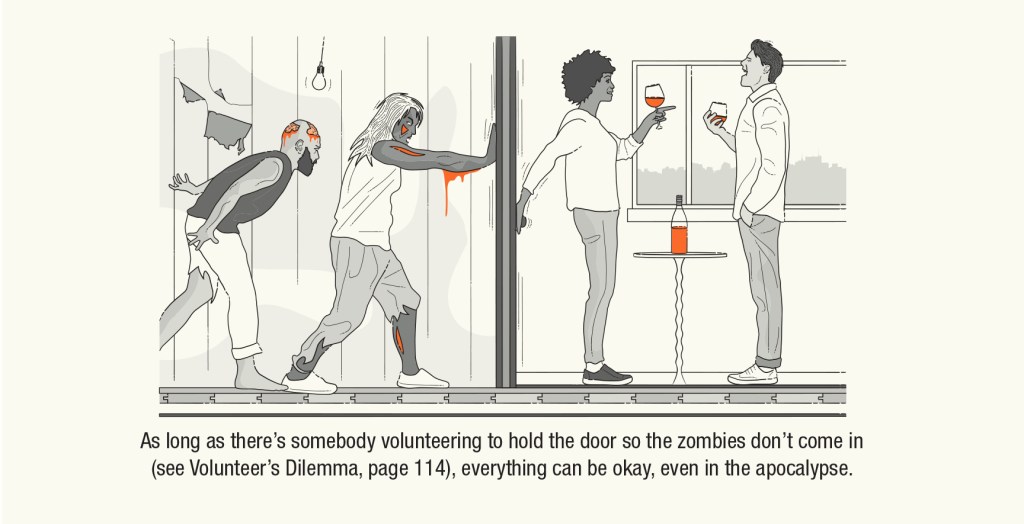
The amazing post-apocalyptic book Station 11 nailed it by going all in with “Survival is insufficient,” a line from a Star Trek: Voyager episode. In Station 11, a community of wandering minstrels share their joy of the arts in the aftermath of a devastating pandemic that killed almost everyone. We humans need more than just food, water, shelter, and physical safety to be okay in the apocalypse. We need each other, we need art, we need opportunities for self-expression and communication, and we need to feel embedded in a community that has a stake in our well-being. These things are necessary for us to thrive, whether in the midst of an apocalypse or in our day-to-day lives. In this chapter, we’ll talk about how we can embrace our apocalyptish times, by shifting our lifestyles and the ways that we see ourselves so we can thrive during The Big One. We’ll also take a seriously deep dive into how having fun can help us deal with catastophes and better prepare for them before they happen. We need more than survival to deal with the apocalypse, we need thrival!
But first, let’s take a humorous look at all the ways that you can fail to thrive in the apocalypse? Here are some of my favorite apocalypse fails:
INDIVIDUAL STRATEGY FAILS
• Put your stuff in a big pile and get on top of it with a gun
• Get a big house and lots (and lots) of highly impractical cars— because, cars
• Build an underground bunker and stock it with a year’s worth of supplies
• Go to space
COLLECTIVE STRATEGY FAILS
• Get an authoritarian leader to solve all the problems
• Ignore the problem (see page 36)
• Start a war
• Blame others for the problem
• Blame others for the problem and start a war
• Go to space
Excerpted from A Field Guide to the Apocalypse: A Mostly Serious Guide to Surviving Our Wild Times by Athena Aktipis. Illustrations by Neil Smith . Workman Publishing © 2024.
About the Book
Is this finally it? The end times?Because from COVID-19 to climate catastrophe to the looming AI revolution—not to mention the ever-growing background hum of rage, fear, and anxiety—it’s starting to feel like the party we call civilization is just about over. The good news? It’s always felt that way.
Drawing on evolutionary psychology, history, brain science, game theory, and more, cooperation theorist (and, coincidentally, zombie expert) Athena Aktipis reassuringly explains how we, as a species, are hardwired to survive big existential crises. And how we can do so again by leveraging our innate abilities to communicate and cooperate.
Pack a ukulele in your prep kit. Practice your risk-management skills. Enlist your crew into a survival team. And embrace the apocalypse. You might just enjoy it. Plus, it will help us build a better and more resilient future for all humankind.
By clicking 'Sign Up,' I acknowledge that I have read and agree to Hachette Book Group’s Privacy Policy and Terms of Use
